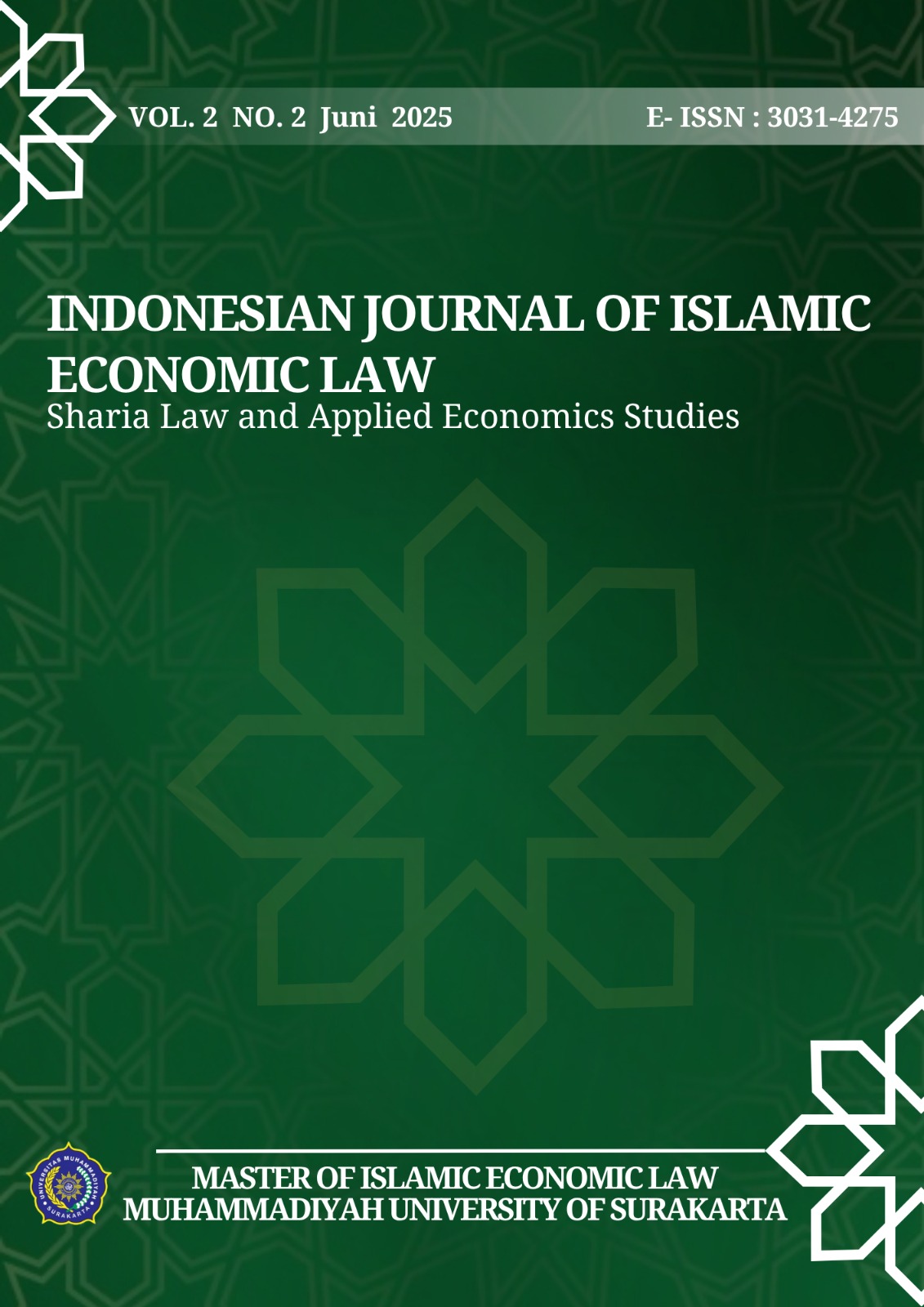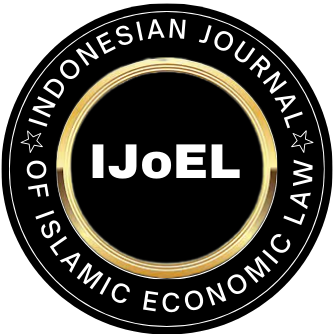Halal Food Fraud in Indonesia: A Sharia-Based Review and Strategic Solutions
Keywords:
halal food fraud, consumer trust, Islamic ethics, food governance, IndonesiaAbstract
This study investigates the phenomenon of halal food fraud in Indonesia, particularly focusing on its forms, drivers, and impact on Muslim consumer trust. This study employs a qualitative approach, utilizing a single case study method that focuses on the city of Surakarta (Solo), Central Java. The data presented herein was collected through a document analysis. The selection of Surakarta as a case study was predicated on its notable concentration of Muslim residents, its rapid growth in the culinary sector, and its status as a major center of Islamic education and culture in urban areas. The research findings revealed ten main forms of halal violations, including the covert use of haram ingredients, fake halal labeling, and improper handling of halal equipment. The prevalence of such fraudulent practices can be attributed to the overarching economic motivations inherent within a capitalist-secular system that places a higher value on profit than on ethical and religious obligations. The study also found significant erosion of Muslim consumer trust due to repeated violations, and demonstrated that non-Muslim business owners' lack of understanding of halal-haram values, coupled with weak law enforcement, exacerbates the problem. This study makes a significant contribution to the existing body of knowledge by offering a novel synthesis of moral, ideological, and legal perspectives on food fraud in Indonesia. The present study underscores the significance of systemic reform by proposing two levels of solutions: (1) short-term practical measures, such as digital tracking, halal literacy programs, and regulatory strengthening; and (2) long-term ideological transformation through the adoption of a comprehensive Islamic framework to ensure moral accountability in the food supply chain.
Downloads
References
Akın, M S, and A Okumuş, ‘Shaping the Consumers’ Attitudes towards Halal Food Products in Turkey’, Journal of Islamic Marketing, 12.6 (2020), pp. 1081–96, doi:10.1108/JIMA-08-2019-0167
Algaisya, Annisa Yasrien, and Valencia Kirana Rosadhillah, ‘MCDM Application on Indonesia Halal Food Development Strategy’, Islamic Economics Methodology, 3.1 (2024), doi:10.58968/iem.v3i1.521
Amalia, F A, A Sosianika, and D Suhartanto, ‘Indonesian Millennials’ Halal Food Purchasing: Merely a Habit?’, British Food Journal, 122.4 (2020), pp. 1185–98, doi:10.1108/BFJ-10-2019-0748
Amer, M, ‘Halal Standards’ Implementation in Palestinian Food Sector: Its Drivers and Impact on Performance’, Arab Gulf Journal of Scientific Research, 42.1 (2024), pp. 2–29, doi:10.1108/AGJSR-09-2022-0168
Anggraini, Wresni, Wakhid Slamet Ciptono, Luluk Lusiantoro, and Heru Kurnianto Tjahjono, ‘Adoption of Analytic Network Process To Strengthen Halal Integrity in the Broiler Chicken Supply Chain’, International Journal of the Analytic Hierarchy Process, 16.1 (2024), pp. 1–28, doi:10.13033/IJAHP.V16I1.1194
Antaranews.com, ‘Praktik Sertifikasi Halal Sebagian Pada Bisnis Makanan’, Antaranews.Com, 2022, p. https://www.antaranews.com, doi:None
Azizah, S N, ‘Cyber-Crime and Fraud Victimization of Online Halal Meat Shops: A Negative Image Propagation’, International Journal of Cyber Criminology, 15.1 (2021), pp. 158–73, doi:10.5281/zenodo.4766540
Azizah, Siti Nur, ‘The Regulation of Halal Label in Non-Packaged Fast-Food Products in Indonesia Online Business’, Malaysian Journal of Syariah and Law, 10.1 (2022), pp. 132–39, doi:10.33102/mjsl.vol10no1.364
Denyingyhot, A, T Srinulgray, P Mahamad, A Ruangprach, S Sa-I, T Saerae, and others, ‘Modern On-Site Tool for Monitoring Contamination of Halal Meat with Products from Five Non-Halal Animals Using Multiplex Polymerase Chain Reaction Coupled with DNA Strip’, Food Control, 132 (2022), doi:10.1016/j.foodcont.2021.108540
Detik.com, ‘Restoran Di Surakarta Menggunakan Lemak Babi Tanpa Memberi Informasi Kepada Konsumen’, Detik.Com, 2023, p. https://www.detik.com, doi:None
Everstine, Karen D., Henry B. Chin, Fernando A. Lopes, and Jeffrey C. Moore, ‘Database of Food Fraud Records: Summary of Data from 1980 to 2022’, Journal of Food Protection, 87.3 (2024), p. 100227, doi:10.1016/j.jfp.2024.100227
Farah, M F, ‘Consumer Perception of Halal Products: An Empirical Assessment among Sunni versus Shiite Muslim Consumers’, Journal of Islamic Marketing, 12.2 (2021), pp. 280–301, doi:10.1108/JIMA-09-2019-0191
Firdaus, F S, R B Ikhsan, and Y Fernando, ‘Predicting Purchase Behaviour of Indonesian and French Muslim Consumers: Insights from a Multi-Group Analysis’, Journal of Islamic Marketing, 14.5 (2023), pp. 1229–59, doi:10.1108/JIMA-05-2021-0169
Gunawati, Anne, Dede Agus, and Muhamad Muslih, ‘Food Security Innovation In Halal Certification Regulation On Food Products (Between Lppom MUI And BPJPH Ministry Of Religion)’, Madinah: Jurnal Studi Islam, 7.2 (2020), pp. 214–29, doi:10.58518/madinah.v7i2.1433
Herliana, Sri, and Inayati Fadhilah Zulfa, ‘Halal Food Development Strategy: Preliminary Study’, Proceedings of International Conference on Halal Food and Health Nutrition, 2.1 (2024), pp. 103–12, doi:10.29080/ichafohn.v2i1.2034
Jia, X, and Z Chaozhi, ‘Turning Impediment into Attraction: A Supplier Perspective on Halal Food in Non-Islamic Destinations’, Journal of Destination Marketing and Management, 19 (2021), doi:10.1016/j.jdmm.2020.100517
Karyani, Etikah, Ira Geraldina, Marissa Grace Haque, and Ahmad Zahir, ‘Intention to Adopt a Blockchain-Based Halal Certification: Indonesia Consumers and Regulatory Perspective’, Journal of Islamic Marketing, 15.7 (2024), pp. 1766–82, doi:10.1108/JIMA-03-2023-0069
Khan, A, M Y Arafat, and M K Azam, ‘Role of Halal Literacy and Religiosity in Buying Intention of Halal Branded Food Products in India’, Journal of Islamic Marketing, 13.2 (2022), pp. 287–308, doi:10.1108/JIMA-08-2019-0175
Kompas.com, ‘Pencampuran Daging Halal Dengan Daging Haram Di Pasar Bandung Dan Bogor’, 2020
Kumparan.com, ‘Kecurangan Dalam Komposisi Makanan Di Pasar Sentiong Jakarta’, 2021
Kurniawati, D A, and A Cakravastia, ‘A Review of Halal Supply Chain Research: Sustainability and Operations Research Perspective’, Cleaner Logistics and Supply Chain, 6 (2023), doi:10.1016/j.clscn.2023.100096
Latif, Yoel, and Nandang Sambas, ‘LITERACY : International Scientific Journals of Social , Education , Humanities Legal Analysis of the Responsibility of Business Actors in Fulfilling Obligations for Halal Certification and BPOM Dis- Tribution Permits for Food Products’, 4.1 (2025), pp. 1–6, doi:https://doi.org/10.56910/literacy.v4i1.1979
Liputan6.com, ‘Penggunaan Mirin Dan Sake Dalam Bumbu Masakan Di Restoran Jepang’, 2021
Mansur, A R, J Oh, H S Lee, and S Y Oh, ‘Determination of Ethanol in Foods and Beverages by Magnetic Stirring-Assisted Aqueous Extraction Coupled with GC-FID: A Validated Method for Halal Verification’, Food Chemistry, 366 (2022), doi:10.1016/j.foodchem.2021.130526
Md Nawi, N H, P H Megat Ahmad, H Ibrahim, and N Mohd Suki, ‘Firms’ Commitment to Halal Standard Practices in the Food Sector: Impact of Knowledge and Attitude’, Journal of Islamic Marketing, 14.5 (2023), pp. 1260–75, doi:10.1108/JIMA-10-2021-0333
Muhammad, M A, A B Elistina, and S Ahmad, ‘The Challenges Faced by Halal Certification Authorities in Managing the Halal Certification Process in Malaysia’, Food Research, 4 (2020), pp. 170–78, doi:10.26656/fr.2017.4(S1).S17
Nurhayati, T, and H Hendar, ‘Personal Intrinsic Religiosity and Product Knowledge on Halal Product Purchase Intention: Role of Halal Product Awareness’, Journal of Islamic Marketing, 11.3 (2020), pp. 603–20, doi:10.1108/JIMA-11-2018-0220
Rejeb, A, J G Keogh, K Rejeb, and K Dean, ‘Halal Food Supply Chains: A Literature Review of Sustainable Measures and Future Research Directions’, Foods and Raw Materials, 9.1 (2021), pp. 106–16, doi:10.21603/2308-4057-2021-1-106-116
Republika.co.id., ‘Penyimpanan Daging Halal Dan Haram Yang Tidak Terpisah Di Restoran Surakarta’, 2021
Rizkitysha, T L, and A Hananto, ‘“Do Knowledge, Perceived Usefulness of Halal Label and Religiosity Affect Attitude and Intention to Buy Halal-Labeled Detergent?”’, Journal of Islamic Marketing, 13.3 (2022), pp. 649–70, doi:10.1108/JIMA-03-2020-0070
Rizqa, Agitsna Alya, and Mukhamad Yazid Afandi, ‘Producer and Consumer Behavior towards the Consumption of Halal Food and Beverages’, International Journal of Islamic Economics, 6.02 (2024), pp. 162–76, doi:10.32332/ijie.v6i2.9545
Shahabuddin, A S M, M E A Sukor, and N H Hashim, ‘Product-Centric Halal Business: A Critique from an Islamic Perspective’, Journal of Islamic Marketing, 11.6 (2020), pp. 1707–24, doi:10.1108/JIMA-06-2019-0129
Sidarto, Larissa P., and Aditya Hamka, ‘Improving Halal Traceability Process in the Poultry Industry Utilizing Blockchain Technology: Use Case in Indonesia’, Frontiers in Blockchain, 4.December 2021 (2021), pp. 1–8, doi:10.3389/fbloc.2021.612898
Suhartanto, D, T Djatnika, T Suhaeni, and L Setiawati, ‘Halal Trust during the COVID-19 Outbreak: The Role of Quality, Perceived Benefit and Health Risk Evidence from Mobile Food Purchasing’, Journal of Islamic Accounting and Business Research, 14.5 (2023), pp. 767–81, doi:10.1108/JIABR-02-2022-0048
Sulistiawati, Nila, Muhammad Said, and Muniaty Aisyah, ‘Halal In The Contemporary Economic And Business Ecosystem’, Cakrawala Repositori IMWI, 6.6 (2024), pp. 2809–16, doi:10.52851/cakrawala.v6i6.604
Sumarliah, E, and B Al-hakeem, ‘The Effects of Digital Innovations and Sustainable Supply Chain Management on Business Competitive Performance Post-COVID-19’, Kybernetes, 52.7 (2023), pp. 2568–96, doi:10.1108/K-09-2022-1326
Tempo.co, ‘Penggunaan Daging Impor Yang Tidak Sesuai Dengan Syarat Penyembelihan Halal’, 2022
Titisari, Retno, ‘Motivation For Implementing Halal Standards In Umkm Food And Beverage DKI Jakarta’, EKOMBIS REVIEW: Jurnal Ilmiah Ekonomi Dan Bisnis, 12.4 (2024), pp. 4331–40, doi:10.37676/ekombis.v12i4.6406
Tribunnews.com, ‘Kasus Penggunaan Label Halal Tanpa Izin Di Banyuwangi’, 2022
Tumiwa, R A F, G M Ningsih, A Romarina, B Slamet, E Waruwu, M Ie, and others, ‘Investigating Halal Food Supply Chain Management, Halal Certification and Traceability on SMEs Performance’, Uncertain Supply Chain Management, 11.4 (2023), pp. 1889–96, doi:10.5267/j.uscm.2023.6.003
Vizano, N A, K Khamaludin, and M Fahlevi, ‘The Effect of Halal Awareness on Purchase Intention of Halal Food: A Case Study in Indonesia’, Journal of Asian Finance, Economics and Business, 8.4 (2021), pp. 441–53, doi:10.13106/jafeb.2021.vol8.no4.0441
Yarar, A E, ‘Halal Advertising on Youtube: A Case Study of Fast Food Brands in Malaysia’, Food Research, 4 (2020), pp. 157–63, doi:10.26656/fr.2017.4(S1).S34
Yuanitasari, Deviana, Agus Sardjono, and Heru Susetyo, ‘The Implications of Halal Regulations in Indonesia: A Consumer Protection’s Legal Perspective’, Padjadjaran Jurnal Ilmu Hukum, 11.3 (2024), pp. 385–404, doi:10.22304/pjih.v11n3.a4
Yunan, Y S M, M H Ali, and S S Alam, ‘Safeguarding Halal Integrity through Halal Logistics Adoption: A Case of Food Manufacturers’, Institutions and Economies, 12.3 (2020), pp. 18–40
ZonaHalal.id, ‘Laporan Investigasi: Pelanggaran Halal Di Indonesia’, 2023
Downloads
Submitted
Accepted
Published
How to Cite
Issue
Section
License
Copyright (c) 2025 Muhammad Sholahuddin, Muhammad Robbani Ridho, Moha Asri Abdullah

This work is licensed under a Creative Commons Attribution 4.0 International License.










